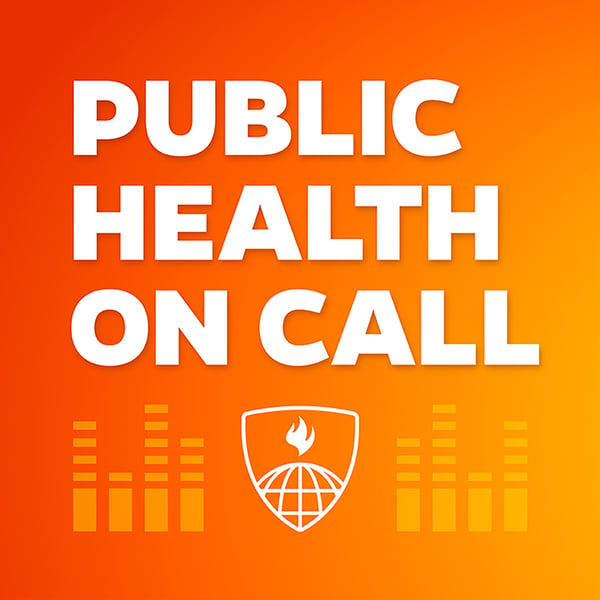908 - A Sharp Decline in Homicides
Public Health On Call
The Johns Hopkins Bloomberg School of Public Health
4.8 • 620 Ratings
🗓️ 17 June 2025
⏱️ 15 minutes
🧾️ Download transcript
Summary
About this episode:
Homicides in the U.S., particularly those involving gun violence, peaked in 2022 following a rapid rise during the COVID pandemic. In the years that followed, there were notable decreases and 2025, so far, shows one of the most dramatic reductions in homicides in decades. In this episode: A look at some of the reasons behind the rise and fall of deaths, and why staying the policy course may be key to avoiding another spike.
Guest:
Daniel Webster is a Bloomberg Professor of American Health who has studied gun violence and prevention for more than thirty years.
Host:
Dr. Josh Sharfstein is vice dean for public health practice and community engagement at the Johns Hopkins Bloomberg School of Public Health, a faculty member in health policy, a pediatrician, and former secretary of Maryland’s Health Department.
Show links and related content:
-
Deadly decisions? Trump guts anti-crime program as summer violence looms—USA Today
-
Supreme Court upholds Biden regulations on ‘ghost gun’ kits—NBC News
-
City of Baltimore Reaches Settlement in Polymer80—Mayor Brandon Scott, Baltimore City
-
A Safer Gun Buying Process—Public Health On Call (February 2025)
Transcript information:
Looking for episode transcripts? Open our podcast on the Apple Podcasts app (desktop or mobile) or the Spotify mobile app to access an auto-generated transcript of any episode. Closed captioning is also available for every episode on our YouTube channel.
Contact us:
Have a question about something you heard? Looking for a transcript? Want to suggest a topic or guest? Contact us via email or visit our website.
Follow us:
-
Here's our RSS feed
Note: These podcasts are a conversation between the participants, and do not represent the position of Johns Hopkins University.
Transcript
Click on a timestamp to play from that location
| 0:00.0 | Welcome to Public Health On Call, a podcast from the Johns Hopkins Bloomberg School of Public Health, |
| 0:05.8 | where we bring evidence, experience, and perspective to make sense of today's leading health challenges. |
| 0:16.1 | If you have questions or ideas for us, please send an email to public health question at jh. |
| 0:21.6 | Jh.edu. |
| 0:23.6 | That's public health question at jh.u.edu for future podcast episodes. |
| 0:31.0 | Hey listeners, it's Lindsay Smith Rogers. |
| 0:34.1 | Today, the steep decline in homicides in the United States. |
| 0:38.6 | John Hopkins Professor Daniel Webster has studied violence for decades. |
| 0:43.2 | He speaks with Dr. Josh Sharstein about what's responsible for the improvement, |
| 0:47.0 | from the ebbing of the pandemic to policy changes sparked by the 2022 Bipartisan Safer Communities Act. |
| 0:55.3 | Let's listen. |
| 0:56.3 | Professor Daniel Webster, so great to have you back on public health on call. |
| 0:59.7 | I gave you a call because I noticed that homicides in the United States have been falling recently. |
| 1:05.5 | Can you tell me a little bit about that trend? |
| 1:08.4 | Sure, yes. |
| 1:10.0 | Homicides peaked in 2022. We've seen dramatic reductions, |
| 1:16.4 | at least dramatic from a year to year kind of change, going from 22 to 23, with approximately, |
| 1:24.8 | I think it was about a 16% reduction in homicides. |
| 1:28.3 | The data for 2024 showed a slightly even greater decline. |
| 1:34.3 | And the year-to-date numbers right now show as much as a, like, a 25% reduction in homicides year-to-date in 2025. |
| 1:43.3 | So the downward slope that we're seeing |
| 1:46.9 | since the peak in 2022 is quite dramatic. I've been studying gun violence for over 30 years, |
... |
Please login to see the full transcript.
Disclaimer: The podcast and artwork embedded on this page are from The Johns Hopkins Bloomberg School of Public Health, and are the property of its owner and not affiliated with or endorsed by Tapesearch.
Generated transcripts are the property of The Johns Hopkins Bloomberg School of Public Health and are distributed freely under the Fair Use doctrine. Transcripts generated by Tapesearch are not guaranteed to be accurate.
Copyright © Tapesearch 2025.

